Best TV antenna Australia
Which is the best TV antenna in 2024?
VIEW OFFERBest of 2024: Find the right TV antenna in Australia
Anyone looking to save money on their TV subscription services should consider buying the best TV antenna for their residence. As with anything you buy to save money, it’s worth being prepared for the initial outlay, which does deter many people from buying a TV antenna, although the one-off cost is far less than what you would pay for a month of a cable or TV subscription service. So, it does work out as a big money saver in the long-term.
The 10 best TV antennas in Australia (November 2024)
The bestseller list compares TV antennas from multiple brands
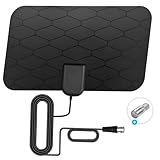
- Installation: Easily install by plugging the coaxial cable into your TV's ANT/IN connector.
- Savings: Save money accessing HD local channels with an amplified digital TV antenna.
- Reception: Best for local channels and live news stations with 360° long-range reception.
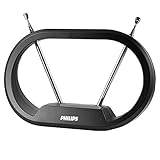
- Stability: Weighted base and rubber feet prevent scratches.
- Cord: Save on cable with local TV access.
- Spectrum: Superior reception for VHF and UHF signals.
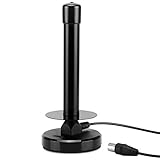
- Flexibility: 2m cable allows flexible positioning for optimum signal.
- Reception: Magnetic base amplifies signal using metal surfaces.
- Installation: Simple and fast setup for HD Freeview on TVs.
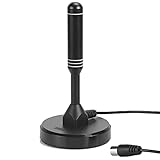
- Compatibility: Ideal with all digital-ready devices like Freeview boxes and TVs.
- Portability: Perfect for portable TVs, multimedia players, and set-top boxes.
- Reception: Clear Freeview broadcasting in bedrooms, lofts, and caravans.
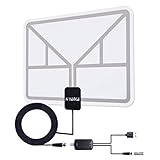
- Compatibility: Works with all TV types and converter boxes.
- Signal: Provides up to 120+ miles range reception.
- Channels: Access free local channels without costs.
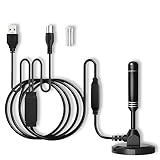
- Design: Compact and discreet, perfect for limited spaces.
- Reception: Pulls in all local HD signals with excellent quality.
- Installation: Simple and fast setup for immediate use.
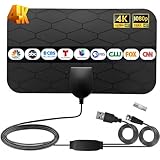
- Design: Soft, ultra-thin design is delicate, lightweight, and easy to install.
- Range: Signal amplifiers enable long-range and 360° reception.
- Channels: Receives HD channels like ABC, CBS, NBC, PBC, and Fox.
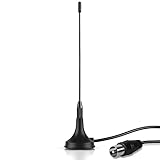
- Reception: Receive clear DVB-T and DAB radio broadcasting.
- Portability: Perfect for portable TVs and multimedia players.
- Compatibility: Ideal for all Freeview ready devices.
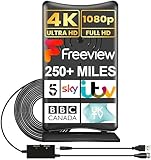
- Quality: Clearer picture, lower noise with upgraded smart IC chip.
- Design: Compact, lightweight with detachable stand and 17ft long coax cable.
- Signal: 360° reception, free TV signal broadcasting.
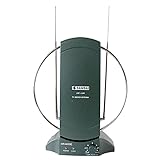
- Convenience: Simple installation and user-friendly setup process.
- Versatility: Supports UHF/VHF/FM/HDTV bands for diverse channel access.
- Amplifier: Enhances signal reception to improve TV picture and sound quality.
Affiliate link: We are a participant of the Amazon Associates Program. If you buy a product through this link we might earn a small commission from Amazon at no extra charge for you. As an Amazon Associate we earn from qualifying purchases.
- Read the definitive TV antenna buying guide
- View the TV antenna picks and see how they rank in the top list
TV antenna buying guide
Do you want to buy a good TV antenna? This is all you need to know.
A short explanation: What are TV antennas?
A television antenna, often referred to as a TV antenna, is a type of transducer used to transmit and receive radio frequency signals. When attached to a television, a quality television antenna allows the television to receive radio signals to provide access to television and radio broadcasts. TV antennas have been used for their entire history of television, with modern antennas large transmitters being used to convert radio signals.
What are the benefits of good TV antennas?
Even the best TV antennas tend to cost a fraction of modern cable and satellite subscriptions, so you can end up saving a lot of money Watch all your favourite shows in high definition, all for free! TV antennas pick up local over-the-air channels as well as any cable channels available in your subscription, with most major stations like FOX, CBS, NBC, ABC, ESPN and more covered, so you will have plenty to watch. Installing a TV antenna and finding the best signal won’t take long, meaning you can watch live TV quickly and for a fraction of the cost of cable or satellite!
How to choose the best TV antenna in 2024?
Choosing the best TV antenna can be difficult if you don’t know what you need, so here are some important things worth considering:
- Range: A very important thing to consider when looking for the best TV antenna, the range indicates how far the device can receive a signal. For example, televisions between your area and the broadcasting tower. TV antennas come with various ranges which are usually measured in miles, with a typical device carrying a range of anywhere between 35 to 60 miles. Lower range TV antennas are fine if you live in the city because the broadcasting tower is never too far away, so a range of under 35 miles should be anfyroe. However, if you live in a more remote area with some distance between you and the local broadcasting tower, a range of 60 miles plus is recommended.
- Installation: TV antennas with a larger range will require more installation to connect it to several televisions and to position it correctly towards the nearest broadcasting tower. This can be rather offputting for many people, espmiela whe you consider that digital TV antennas work best on the roof. If you’d rather not install the TV antenna yourself, you can pay someone to fit it for you, but this will obviously add to the costs.
- Number of Channels: While all TV antennas allow access to freeview channels, they will pick up a variety of different local and national stations, but the amount can vary. The idea that TV antennas only pick up a few channels is a common misunderstanding, as even basic devices can pick up double figures, in terms of channel numbers. Consider how many you want, too, for their range, the more channels can be picked up. For instance, if you live in a city, you are unlikely to need more than 20 channels, so the range on the TV antenna doesn’t need to be too high.
Which types of TV antennas are available to buy in Australia?
There are many different types of TV antennas, all of which offer their own set of advantages. The most popular types of TV antennas include:
- V-Style TV Antennas: Shaped like the letter V, these antennas pick up UHF signals using a single bowtie loop, making them great for HD local channel reception. They are the smallest of all TV antennas so typically have the lowest range, meaning signal strength can be affected by tall objects, the distance from the tower, etc.
- Multi-Directional TV Antennas: As the name suggests, these TV antennas can be pointed in multiple directions, allowing for easier installation as you don’t need to pinpoint the location of the broadcast tower. If you’re trying to receive a signal from more than one location, this is the best TV antenna for the job.
- Yagi TV Antennas: Known for its long elements and scoop-like reflector, Yagi TV antennas offer the best range of all TV antennas. It is highly directional, meaning you need to point it in the precise direction of the broadcast tower, but as long as you do this you should get a fantastic signal. Favourite for use in areas with lots of obstructions that can weaken the TV signal, it’s a good option but can be quite challenging to set up.
